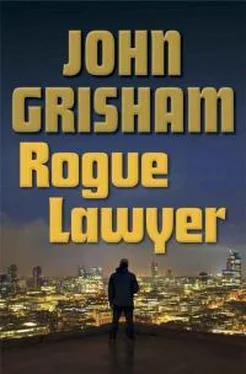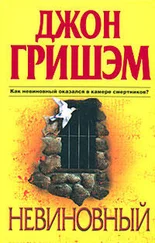Yes, in Dr. Taslman’s opinion, Tadeo was so deranged he could not stop himself. Yes, he was legally insane, and therefore unaccountable for his actions.
And there is another, quite unusual factor in play here that makes the case unique. Tadeo was in a cage designed for fighting. He had just spent nine long minutes trading punches with another fighter. He makes his living punching people. To him, at that crucial moment, it was okay to settle the matter with more punches. Put in context, and in the environment of that instant, he felt as if he had no choice but to do what he did.
When I’m finished with Taslman, we break for lunch.
26.
I stop by Domestic Relations to check the court file. As expected, old Judge Leef has denied Judith’s request for an emergency hearing, and has scheduled the matter four weeks from now. His order also states that regular visitation will continue unchanged. Take that, sweetheart.
Cliff, Partner, and I walk a few blocks to a diner and hide in a booth for a quick sandwich. The morning’s testimony could not have gone better for Tadeo. All three of us are surprised at how well Oscar did on the stand, and how believable he was in telling the jurors that Tadeo had been knocked out, but was still standing. Few fight fans would believe that, but there are none on our jury. For $20,000, I expected Dr. Taslman to perform admirably, and he did. Cliff says the jurors are thinking now, with some doubt firmly planted. However, an acquittal is impossible. A hung jury is still our only chance. And it could be a long afternoon as Mancini goes after our expert.
Back in court, Max begins by asking, “Dr. Taslman, at what moment did the defendant become legally insane?”
“There is not always a clear beginning and ending. Obviously, Mr. Zapate became furious over the judges’ decision awarding the fight to his opponent.”
“So, before that moment, was he insane by your definition?”
“It’s not clear. There is a strong likelihood that Mr. Zapate had been mentally impaired during the last few minutes of the fight. This is a very unusual situation, and it’s not possible to know how clearly he was thinking before the decision was announced. It’s pretty obvious, though, that he snapped quickly.”
“How long was he legally insane?”
“I don’t think it’s possible to say.”
“Okay, under your definition, when the defendant whirled around and struck Sean King with the first punch, was that an assault?”
“Yes.”
“And punishable by some standard?”
“Yes.”
“And excusable, in your opinion, because of your definition of legal insanity?”
“Yes.”
“You’ve seen the video many times. It’s clear that Sean King made no effort to defend himself once he fell to the deck and was sitting against the cage, right?”
“That appears to be the case.”
“Do you need to see it again?”
“No, not at this time.”
“So, after only two punches, Sean King is down and out, unable to protect himself, right?”
“That appears to be the case, yes.”
“Ten punches later, his face is bleeding and basically pulverized. He cannot protect himself. The defendant has hit him twelve times around the eyes and forehead. Now, at that point, Doctor, was the defendant still legally insane?”
“He could not control himself, so the answer is yes.”
Mancini looks at the judge and says, “Okay. I want to run the video again in slow motion.” The lights are dimmed yet again, and everyone stares at the large screen. Max runs it in super slow-mo and announces loudly as each punch lands, “One! Two! He’s down now. Three! Four! Five!”
I glance at the jurors. They may be tired of this footage but they’re still captivated by it.
Max stops with blow number twelve and asks, “Now, Doctor, you’re telling this jury that they’re looking at a man who knows he’s doing wrong, violating the law, but cannot physically or mentally stop himself. Is that right?” Max’s tone is one of incredulity and mockery, and it’s effective. What we’re watching is a slaughter by one pissed-off fighter. Not a man driven insane.
“That’s correct,” Dr. Taslman says, not yielding an inch.
Thirteen, fourteen, fifteen, Max counts them off slowly and stops at twenty. Max calls out, “Now, at this point, Doc, is he still insane?”
“He is, yes.”
Twenty-one, twenty-two, and bodies land on Tadeo as Norberto finally dives on and stops the carnage. Max asks, “How about now, Doc, they’ve pulled him off and the attack is over? At what point does the boy return to sanity?”
“It’s hard to say.”
“A minute later? An hour later?”
“It’s hard to say.”
“It’s hard to say because you don’t know, right? In your opinion, legal sanity is like a switch that flips on and off, rather conveniently for the defendant, right?”
“That’s not what I said.”
Max pushes a button and the screen disappears. The lights are brightened as everyone takes a breath. Max whispers to an assistant and picks up another legal pad covered with notes. He shuffles to the podium, glares at the witness, and asks, “What if he hit him thirty times, Dr. Taslman? You’d still diagnose him as legally insane?”
“Under the same set of facts, yes.”
“Oh, we’re talking about the same facts. Nothing has changed. What about forty times? Forty blows to the head of a man who’s clearly unconscious. Still legally insane, Doc?”
“Yes.”
“This defendant showed no signs of stopping after only twenty-two. What if he landed a hundred shots to the head, Doc? Still legally insane in your book?”
Taslman earns his money with “The greater number of punches is clearer evidence of a deranged mind.”
27.
It’s Friday afternoon and there’s no way we can finish the trial today. Like most judges, Go Slow likes to jump-start the weekend. She warns the jurors about unauthorized contact and recesses early. As the jurors file out, Esteban Suarez glances my way one more time. It’s as if he’s still looking for the envelope. Bizarre.
I spend a few minutes with Tadeo and recap the week. He still insists on taking the stand, and I tell him that will probably happen Monday morning. I promise to stop by the jail on Sunday and go through his testimony. I repeat my warning that it’s never a good idea for the accused to testify. He’s taken away in handcuffs. I spend a few minutes with his mother and family and answer their questions. I’m still pessimistic but I try to hide it.
Miguel follows me out of the courtroom and down a long hallway. When no one is listening, he says, “Suarez is waiting. Contact confirmed. He’ll take the money.”
“Ten grand?” I ask, just to make sure.
“Sí, senor.”
“Then go for it, Miguel, but just leave me out of it. I’m not bribing a juror.”
“I guess then, senor, that I need a loan.”
“Forget it. I don’t make loans to clients, and I don’t make loans that’ll never be repaid. You’re on your own, pal.”
“But we took care of those two thugs for you.”
I stop and glare at him. This is the first time he’s mentioned Link’s boys—Tubby and Razor. Slowly, I say, “For the record, Miguel, I know nothing about those two. If you whacked ’em, you did it on your own.”
He’s smiling and shaking his head. “No, senor, we did it as a favor for you.” He nods to Partner in the distance. “He asked. We delivered. Now we need the favor returned.”
I take a deep breath and stare at a huge stained-glass window the taxpayers paid for a century earlier. He has a point. Two dead thugs are worth more than ten grand, at least in the currency of the street. The breakdown comes with the communication. I didn’t request two dead thugs. But now that I benefit from their demise, am I obligated to return the favor?
Читать дальше












